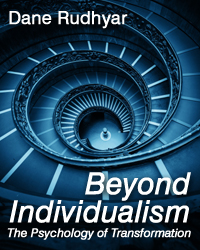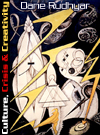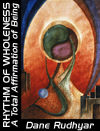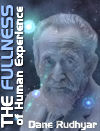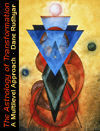Beyond Individualism
The Psychology of Transformation
by Dane Rudhyar
PART ONE:
THE PERSONAL-INDIVIDUAL MODE
2. The Four Orders of Functions
c. Functions of the Third Order
The appearance of the type of activity and consciousness which can be classified as a third order of function may be considered from two different points of view. The usual one in our empirical and materialistic culture directs our attention to what must have outwardly taken place in small tribal societies. On the other hand, from an 'esoteric' point of view, the appearance of the new type of consciousness and activity—thus of a new way of responding and relating to human existence within the biosphere—is interpreted as the result of the impact of a particular type of spiritual energy and will upon an as yet quasi-animal mankind totally subservient to biological drives and unconscious compulsions.
This impact also involved a transcendental and cosmic kind of 'compassion'; we find it mentioned in Greek mythology as Prometheus' gift of divine fire to unself-conscious primitive humanity. In Hindu mythology, it is pictorialized as the coming to our planet of the Kumaras, a group of spiritual-cosmic Beings from some more advanced realm of existence symbolically referred to as 'Venus'.(1)
The empirical and sociopsychological interpretation of the way in which functions of the third order developed in primitive societies poses but few problems. It is based on expectable reactions of a tribesman to some kind of personal achievement— discovery, invention, or inner revelation—which singled him out and brought him to a position of prestige. This, in turn, led him to the realization (at first temporary, then increasingly accentuated) of being in an uncommon way, different from other tribesmen. At first the tribesman in such a position is likely to have considered himself only the mouthpiece or instrument of the tribal god; but admiration, the loving attention of women, and continued success could easily have developed in him a deep feeling of pride in his achievements and inner isolation—the feeling of being 'special' and endowed by his god with a unique status.
On the other hand, if a tribesman felt himself a failure or for some reason could not live up to the expectations of his peers (perhaps because of some special deficiency or deformity), he might also come to regard himself, in a negative sense, separate and different from the tribal group. Once emphasized, difference —whether positive or negative—has to be interpreted by the mind. It is given some kind of meaning. It makes a person feel apart from the group, even if only in a subtle way. It produces the sense of being either 'above' or 'outside of the other members. A sense of detachment, isolation, and in some circumstances, the refusal to submit to common standards because they are felt to no longer apply to one's unique or special case, act as individualizing factors.
A new type of interpersonal relationships takes form when intertribal contacts and exchanges become more frequent and more complex. As travel, trade, personal acquisition of wealth, and marriage to people of other cultural backgrounds extend the field of consciousness as well as the problems the tribe has to face, and above all as large cities are built, an increasing number of human activities lose some of their natural biological character; they become socialized and culturalized in an altogether new way. The city acts as an individualizing frame of reference, even when retaining a relatively homogeneous character. This character gradually loses its strength when slaves become incorporated, even though not integrated, in the city-whole. The relationship of the husband to wife and even of children to parents now living in more clearly defined and often isolated dwellings, changes. City organization calls for specialization.
The image of the autocratic king claiming to represent or even embody what once was the unifying presence of the tribal god also becomes a subconscious and idealized focal point for the growth of the sense of individuality. At first the king's image is glorified by a new kind of religion, non-tribal in character, and his power is supported by a tentacular bureaucracy and police. But the rivalries, corruption and abuses of absolute power result in psychological as well as political upheavals. In time, the people rise and sooner or later, every human being dreams of being a king in his own right. Even though the voice of the divinely inspired Prophet proclaiming that the Kingdom of Heaven is within every human being is stilled and a religious bureaucracy perpetuates itself "in His Name," the new image is not totally forgotten and it eventually makes its mark upon Western society.
The important point in this sketchy historical picture is that the sense of individuality develops in the midst of societies transformed by a new and dynamic kind of mind-activity attempting to deal with new problems of relationship between persons no longer entirely dominated by biological drives or their glorified and universalized symbolic projections. This urge to be and act as an individual, intent on asserting his own at least relatively unique status as an 'I am,' develops both on the background of society, religion, and culture, and against the inertial power of the type of inbred unanimity of response which, in the old tribal state, was natural and unchallengeable, but in large centralized societies acquires an oppressive character. The result of such a situation is the development of the ego.
If one considers the development of the ego in individuals in terms of its outer perceptible manifestation, this development can be related to the process of imitation (or mimesis) characteristic of infancy during the first two years of life. The baby's consciousness is molded by what it feels, perceives, and hears in the family environment. He hears adults referring to him or her as Paul or Jane. He establishes relatively steady patterns of relationship with parents, nurses, or siblings, each of whom asserts his or her character of being as a particular, separate, definable entity. The result is that the very young child begins to claim objects as 'mine' and to say 'I want'. As the child grows up, the 'I-feeling' normally develops in intensity, but in direct relation to the socio-cultural patterns of thinking-feeling-behaving prevalent in the immediate environment. This relation may be positive or negative: the socio-cultural patterns may be accepted passively, adjusted to in search of the maximum pleasure and comfort of the body-as-a-whole, and cleverly used by the developing intelligence which, at this stage, is the servant of biological motivation. Or, the child may respond negatively to environmental pressures, lack of interest or love, or sibling competition and develop an ego polarized by an instinctive reaction against the environment.
However, to simply consider the ego as a conscious feeling-realization of being different from other human beings who affect the body-consciousness, but also who can be used and played with for bodily rewards, does not tell the whole story. One must also deal with the manner in which the manifestation of the ego appears and develops. These manifestations become more or less set as 'character', but at the root of the feeling of 'I' we should postulate what I have called 'the self. This word, self, has a very ambiguous character and has been given a great variety of meanings. As I use the term, the self is the power that establishes the particular nature, the essential character and the vibratory frequency of a living organism.
In the animal kingdom the self is generic, not individualized. All the members of a species have but one self, common to all. Selfhood is not differentiated or particularized. There are superficial differences between the members of the species, but fundamentally, the species-as-a-whole alone has a self. All its members are rooted in it. It is a generic power.
In human beings, however, selfhood is potentially individualized. There is a generic self referring to the characteristics of homo sapiens; but at the core of every human being, an individual self is present as a latent power. Self is power, not consciousness. Consciousness is the expression of the wholeness of the organic field of activity we call a human being; but at first, consciousness is purely biological, because 'life' is the basic sustaining power. Something has to be added to life to bring out the possibility of individualized selfhood. According to all traditions, this 'something'—to which I have often referred as the 'God-seed'— results from the action of superior, Earth-transcending entities. It is the previously mentioned Promethean gift.
The ego has been defined by Carl Jung as the center of the field of consciousness, and also as its circumference. If the ego is considered as a power of integration, it is so only as the reflection of the self. The ego is not power, but only the reflection of power at the center of the field of consciousness. The ego is actually far more occupied with what occurs at the circumference than at the center, for it is at the circumference of his or her being that a person faces, and in some manner has to react or respond to the pressure and impacts of the social, cultural, and biospheric environment. The ego is, in fact, a mechanism of adjustment to the socio-cultural environment. Yet this mechanism implies the existence of a sustaining power—the self—which gives to the mechanism its essential purpose and in some way can make its presence felt, even if the ego does not realize what this power is. Without the operative, even though subconscious and 'occult' presence of this self, the ego could not challenge the compulsion of 'life' operating as biological instincts. But the ego is not aware of the source of the power enabling it to resist instinctual drives which no animal can disobey.
The ego is involved in, and concerned only with, mechanisms and techniques of adjustments to, or control of, the environment. By the use of intellectual faculties—which at first manifest as cunning—it discovers its capacity to affect other people and material things so as to increase its pleasures or comfort and to avoid pain. The ego thus acts as a technician, an engineer. But while it uses the mind as an instrument, it also finds itself molded by, and often the prisoner of, the mind. The mind's activities bind the ego—somewhat like a political ruler or executive often finds himself thwarted by the bureaucracy through which he has to operate. The ego not only becomes subservient to the mechanisms it is using (the mind), but most of the time its motives and goals are dictated—whether it realizes it or not —by biological drives and by the social and ethical imperatives of the culture in which it has developed, or by an emotional and often blind rebellion against either biology or culture. Yet, behind this rebellion, or even behind the ego's ambition to fulfill a particular aspect of the culture in an original and fame-producing manner, stands the power of the self. The self is the individualizer. Because of its presence, the ego can develop within the mind-field, giving to that field centrality and a particular structure. Still, the ego (at least for a long time) is not aware of the self as the source of its power; it is too occupied with what it is doing and with handling situations which constantly pose problems of adjustment or offer new opportunities for expansion and mastery over the environment.
In contrast to this restless and multifarious activity of the ego, the self simply is—what it is. It is the power required to fulfill the purpose (or dharma) inherent in the fact that a human being is born at a certain place and a particular time. Because it is 'human', this being is not only endowed with life, but with the potentiality of consciously fulfilling a particular role within the planetary field of the Earth as an individual self. In order to actualize this potentiality, the diffuse consciousness characterizing the prehuman levels of evolution has to become structured and centralized. The process of structuring takes place through the development of culture (second order of function), but culture centralizes the consciousness of a collectivity of human beings (a community). At this stage, centralization is, in a sense, outside of any particular person. As the power of the self asserts itself more strongly within a few individuals, and at the same time outer circumstances pressure these individuals into developing a sense of superiority or of relative isolation (and perhaps alienation) from their community, the consciousness of these individuals begins to centralize itself. The more 'special' the activities of these persons and their responses to social pressures, the more insistently the feeling of internal centrality is experienced. But this feeling remains conditioned by outer circumstances and activities; it is attached to them, and the result is the development of an ego so concerned with what occurs at the circumference of the field that it cannot be aware of what is at the root of this 'I-feeling'
.Considered from the point of view of the evolution of mankind, two factors combine to produce the ego. On the one hand, the ego is the product of changing conditions and increasing complexities in the development of culture-wholes. There is also the activation of the potentiality of individual selfhood—a potentiality which, I repeat, tradition claims to have been imparted long ago to primitive, animal-like mankind by Promethean beings. Yet, as far as our present humanity is concerned, it is only since about 600 B. C. that the development of an objective intellectual-analytical mind, at least theoretically detached from biology and culture, began to affect the collective life of human societies. The activity of this mind manifests in numerous ways, and I refer to them as functions of the third order.
Our Western society, especially since the European Renaissance, has been the first to conspicuously feature ideals and concepts of organization based on such a type of functional activity. The result has been the extraordinarily rapid growth of modern science and technology, and the spread of democratic institutions, at least, theoretically proclaiming the worth and dignity of the individual person and legalizing individual rights, in principle without any biological (sex, color, race) or cultural (class, caste, wealth-state) qualifications. Our Western society has glorified 'rugged individualism' and an uncontrolled freedom of operation and personal ambition under the name of laissez-faire. It has become a society of egos, by egos and for the greater glory of egos under the pretense of allowing full uninhibited self-expression and 'self-actualization'. It is a society which has also become hypnotized by technology and mechanisms of all types. The ego depends upon mechanisms and techniques in order to be active at the circumference of existence; and it finds excitement and justification for its passion for controlling everything and everyone in an activity aggressively directed against whatever is an obstacle to its 'freedom' or whatever challenges the validity of the set patterns of thinking-feeling defined by the mind over which it rules. Yet, this multifarious ego-activity fills a necessary function in the development of mankind. Through ego-activity, the process of evolution continues to transform human consciousness, freeing it from total subservience to biological compulsions and from attachment to the rigid traditions and limiting world-view of a particular culture.
What the ego believes to be 'freedom' is, nevertheless, anarchy. It expresses the negative and catabolic aspect of civilization; and it flourishes in a paradoxical way in our modern megalopoles—paradoxical in that ego-freedom soon turns into a tragic state of bondage to the compulsion to feel free, independent and self-motivated at any cost. The true kind of autonomy is only found in the self. The self does not need to 'prove' itself free and autonomous. It is what it is, without any concern about what this particular 'is-ness' implies in relation to other kinds of 'isness'. There is no concern because true selfhood does not refer to consciousness or relationship, but only to power—the power to be what one is. Yet, this power does not operate in isolation. It represents one small but precise vibration (or tone) in the immense chord of mankind. But this small tone vibrates at a level that transcends the mind and its techniques and categories.
The ego does not function at that level; it only reflects what takes place there. But in doing that reflecting it brings the supernatural reality to a state of consciousness which can be formulated and transferred. The ego, and all third-order functions which refer to the conscious mind, work in two ways. All these activities, consciously or not, strive to raise human consciousness from the biological-cultural level to the 'spiritual' level. In their noblest forms these activities infuse spirit into biology and culture. But this means breaking down the particularity and exclusivity inherent in any culture-whole—as culture-wholes have been so far—and opening the collective (as well as the individual) mind to a state of total mclusiveness and interpenetration.
This breaking-down process can take many forms. Some are catharses leading to a radical repolarization of the mind and a transmutation of biological energies and socio-cultural allegiances; others have seemingly, or at least temporarily, destructive results. It is because this process is potentially so dangerous in the atmosphere of our city-civilization that it can best be experienced on the individual level within the extended field of vibration (or aura) of human beings who, having passed at least to some degree through the process, radiate a holistic and compassionate spirituality that accepts every human function as partial means to the realization of a state of multi-level, polyphonic development. In such 'trans-individual' personages, functions of the fourth order operate. In due time these functions will bring about a new condition of transhuman existence in which biology will be transcended or transfigured. Men will gradually lose their personal ambition, their pride of achievement and their catabolic jealousies, and culture will lose its collective focusing on exclusivity.
In that state of existence, love—having overcome biological compulsiveness, its culture-bred class distinctions and egocentric insecurity and possessiveness—will be able to flourish in unpolluted radiance and pan-harmonic inclusiveness. It will be the foundation upon which function of the fourth order will develop and a new world will be built. The earth will become a garden reflecting the many-sided inner culture of integrated human persons no longer needing wilderness to balance and redeem the artificiality of their ego-minds. The spiritual darkness of our festering megalopoles will be forgotten then. Then human beings, in a much reduced number, will celebrate their common divinity in 'Holy Cities.'
1. Venus here need not be thought of as the present planet of that name. The Kumaras may be considered a part of the spiritual harvest of evolution in some planetary scheme that long ago (according to the Hindu theosophical tradition, at least 11 million years ago) had reached its "omega point". In this sense, the Kumaras would represent a seed of planetary consciousness and potential energy blown across cosmic space by the winds of destiny (karma) and reaching the virgin soil of the Earth—though not the normally physical soil, but a far more subtle realm of existence, then as yet undeveloped. The Kumaras might have actually come from the subtle realm of the planet Venus after it had "dematerialized", or reached a state of obscuration. If the theory advanced by Velikovsky is at all valid, it could be that a large comet of physical matter would have been drawn into the field of this dematerialized Venus, which as a result would have begun a new cycle of material existence. This hypothesis, wild as it may seem to astronomers, would reconcile the Velikovsky theory and the ancient occult teaching. It may not be more fantastic than some recent astronomical hypotheses. Return
Functions of the Fourth Order
Copyright © 1979 by Dane Rudhyar.
All Rights Reserved.
See Notices for full copyright statement and conditions of use.
Web design copyright © 2000-2004 by Michael R. Meyer.
All Rights Reserved.


